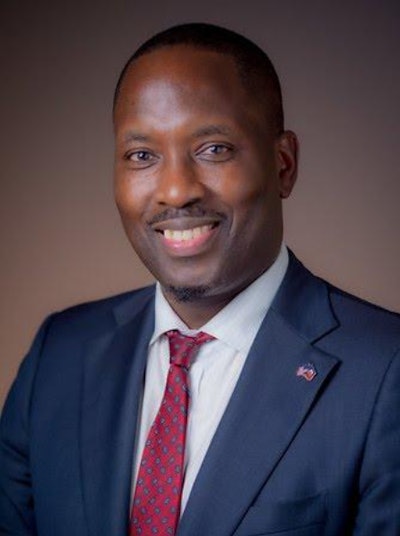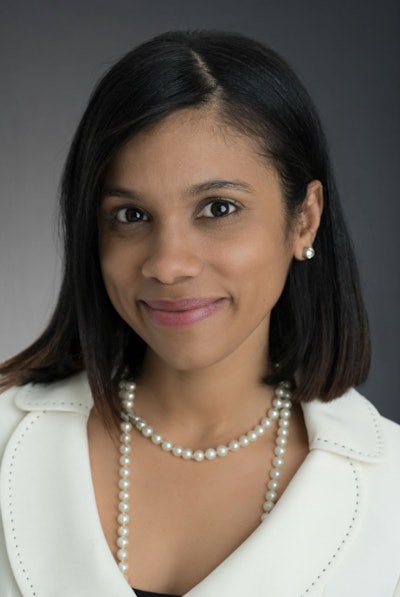When Dr. Daniel Jean talks with young male scholars at Montclair State University (MSU) in Montclair, NJ, he asks them to raise their hands if they know someone who died from street violence.
“Nine out of ten raise their hands,” said Jean, assistant provost for special programs at MSU.
 Dr. Daniel Jean, assistant provost for special programs at Montclair State university.
Dr. Daniel Jean, assistant provost for special programs at Montclair State university.
“His untimely death is a stark reminder about the importance of our work,” said Jean. “It impacts us emotionally, but we’re using that to repurpose, to move forward intentionally. We recognize our responsibility at MSU and in New Jersey to try to impact these urban centers.”
Jean’s work at MSU helps him connect with some of these populations. His Future College Graduate Academy targets potential scholars from low-income homes that earn less than $55,000 a year and sees them through graduation. It helps roughly 100 students complete college each year.
Now, thanks to the support and push from MSU president Dr. Jonathan G. S. Koppell and administration, MSU is hoping to expand its outreach to young males of color, particularly Black and Brown youth in urban areas in New Jersey. It’s launching its Male Education and Graduation Alliance (MEGA), a workgroup charged with developing strategies for the recruitment and retention of Black and Latinx males.
MEGA’s first event on November 16 will gather together nearby male high school students and their counselors to share their concerns about college and what might compel them to pursue higher education. What Jean and other MEGA scholars learn from that day will be shared on March 3, 2023, when MSU will host its first MEGA Symposium, which will provide stakeholders in and outside higher education a chance to come together and develop partnerships and pipelines that will see an increased number of Black and Latinx men on track to graduation. The event has received strong support from a number of organizations, including the Center for Advocacy and Philanthropy at the Educational Testing Service (ETS).
In fall 2021, the Brooking Institution, a nonprofit public policy research organization, found that males make up four out of every ten college students. Male enrollment began to fall in 2012 but dropped dramatically after the pandemic in 2020, and enrollment rates have decreased along with rates of completion.
“The declining number of male students of color in higher education is a troubling national problem—in fact, the numbers are shocking,” said Junius Gonzales, provost and senior vice president of academic affairs at MSU. “A college education is the ticket to a better future in our society, and it’s our responsibility to do everything we can to provide opportunities for as many people as possible.”
While MSU has a compelling track record of reaching populations of color, Jean said there’s a lot to be learned from other institutions as well, and he is eager to see great minds come together and collaborate.
Dr. Carolina Gonzalez, assistant dean for administrative, external and student affairs in the college of education and human services at MSU, is helping to coordinate and plan MEGA’s events. She said this work is deeply personal for both her and Jean. Jean was once a young man in New Jersey struggling to keep his high school GPA above 1.0. In neighboring New York state, Gonzalez watched her three brothers matriculate through the educational system with differing levels of success.
“The sense of belonging was not necessarily there for [my brothers],” said Gonzalez. “For students, it’s really about finding ways to connect with the meaning, the value of education, beyond this goal of, ‘I want to get a college degree.’”
 Dr. Carolina Gonzalez, assistant dean for administrative, external and student affairs in the college of education and human services at Montclair State University.
Dr. Carolina Gonzalez, assistant dean for administrative, external and student affairs in the college of education and human services at Montclair State University.
Junius Gonzales agreed.
“Institutions need to work in partnership with the communities we serve to develop an entire ecosystem to encourage and support higher education participation,” he said. “It takes a multipronged commitment across all of the elements of the community, from schools to faith-based organizations, local governments, employers and the respected elders in the community.”
MSU often partners with its nearby urban centers Newark and Paterson. The university collaborates with Newark’s public K-12 schools to build a teacher pipeline, working to alleviate the teacher shortage and create role models for area youth. In Paterson, MSU works with partners to reduce teen substance abuse and educate around HIV and AIDs. This level of partnership will continue during and after the MEGA symposium.
“What I think is important is that we don’t see [the male enrollment crisis] solely as an education concern, we see this as an issue that connects to our communities, to our economy, to a lot of other facets of our society,” said Gonzalez. “We’re well aware that in order to evolve the work of this endeavor, there needs to be collaborative effort, not just institutionally but in the state and nationwide. We want to be leaders in this endeavor.”
Liann Herder can be reached at [email protected].



















